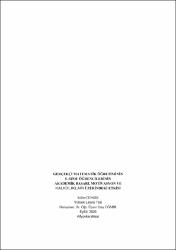Gerçekçi matematik öğretiminin 5. Sınıf öğrencilerinin akademik başarı, Motivasyon ve kalıcılıkları Üzerindeki etkisi
Özet
Bu araştırmada, Gerçekçi Matematik Öğretimi’nin (GMÖ) 5. sınıf “Veri işleme” öğrenme alanına ilişkin akademik başarı, motivasyon ve kalıcılık üzerindeki etkisi araştırılmıştır. Araştırmada ön-test son-test kontrol gruplu yarı deneysel desen kullanılmıştır. Afyonkarahisar ili Bayat ilçesinde iki ortaokulda, 2018-2019 eğitim-öğretim yılı ikinci döneminde gerçekleştirilen araştırma, 19 kişi deney ve 22 kişi de kontrol grubu olmak üzere toplam 41 öğrenci ile yürütülmüştür. Uygulamalar deney grubunda GMÖ yaklaşımı ile düzenlenirken, kontrol grubunda ise Milli Eğitim Bakanlığı (MEB) ortaokul matematik dersi öğretim programında yer alan etkinlikler doğrultusunda gerçekleştirilmiştir. Uygulama iki hafta sürmüştür. Çalışmada, veri toplama aracı olarak 18 maddelik “Veri İşleme Öğrenme Alanı Kazanım Değerlendirme Formu (VİKDF)” ve Aktan (2012) tarafından geliştirilen “Matematik Motivasyon Ölçeği (MMÖ)” kullanılmıştır. VİKDF ve “Matematik Motivasyon Ölçeği (MMÖ)” deney ve kontrol gruplarına uygulama öncesi ön-test, uygulama sonrası son-test ve son-testten dört hafta sonra da kalıcılık testi olarak uygulanmıştır. Uygulama sonucunda elde edilen verilerin analizinde ilişkisiz örneklemler t-testi, ilişkili örneklemler t-testi, Mann Whitney-U testi ve tek yönlü kovaryans analizi (ANCOVA) kullanılmıştır. Analizler sonucunda deney ve kontrol grupları arasında başarı, motivasyon ve kalıcılık puanlarında anlamlı farklılık bulunmamıştır. In this study, the effect of Realistic Mathematics Education (RME) on academic succes, motivation and retention of 5th grade students in “Data Procressing” learning field was investigated. In the research, quasi-experimental design with pre-test post-test control group was used. The research carried out in two secondary schools in the district of Bayat in Afyonkarahisar province in the second term of 2018-2019 academic year was conducted with a total of 41 students, 19 of whom were experimental and 22 were control groups. While the applications were organized with the RME approach in the experimental group, the control group was carried out in line with the activities included in the Ministry of National Education secondary school mathematics curriculum. The application lasted two weeks. In this study “Data Progressing Field of Learning Acquisition Evaluation Form” including 18 items and “Mathematical Motivation Scale" which was improved by Aktan was used as data collection tools. Acquisition evaluation form and “Mathematical Motivation Scale" were applied to the experimental and control groups as pre-test before application, post-test after application and retention test four weeks after post-test. After application independent samples t-test, related samples t-test, Mann Whitney-U test and one-way analyssis of covariance (ANCOVA) were used in the analysis of the data. As a result of the analysis, there was no significant difference in achievement, motivation and retention scores between the experimental and control groups.
Bağlantı
https://hdl.handle.net/11630/9799Koleksiyonlar
- Yüksek Lisans Tezleri [2074]



















